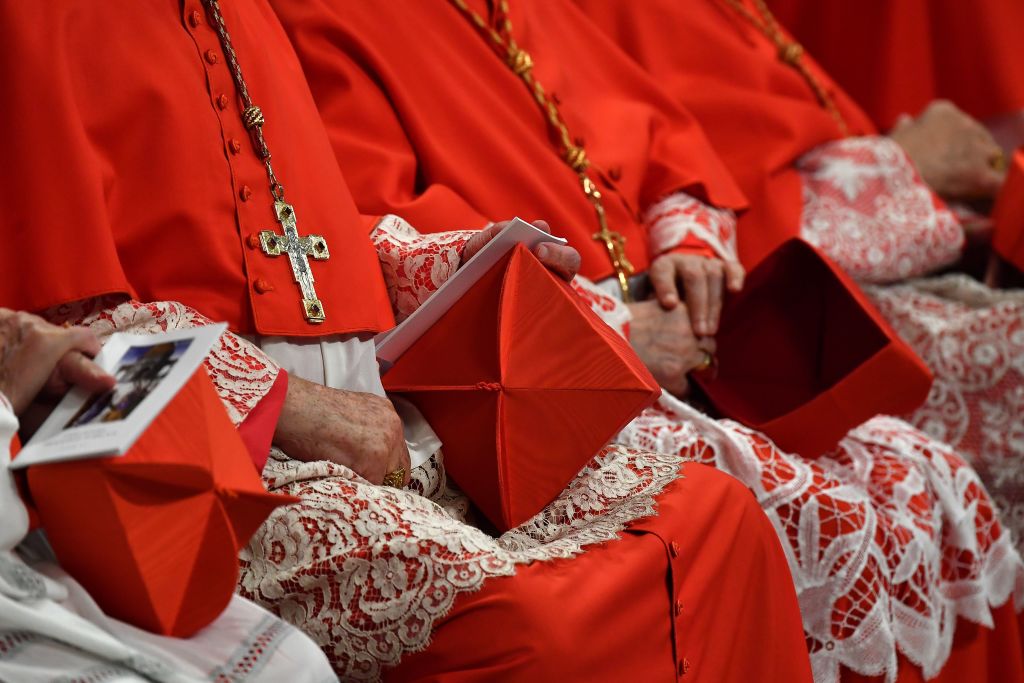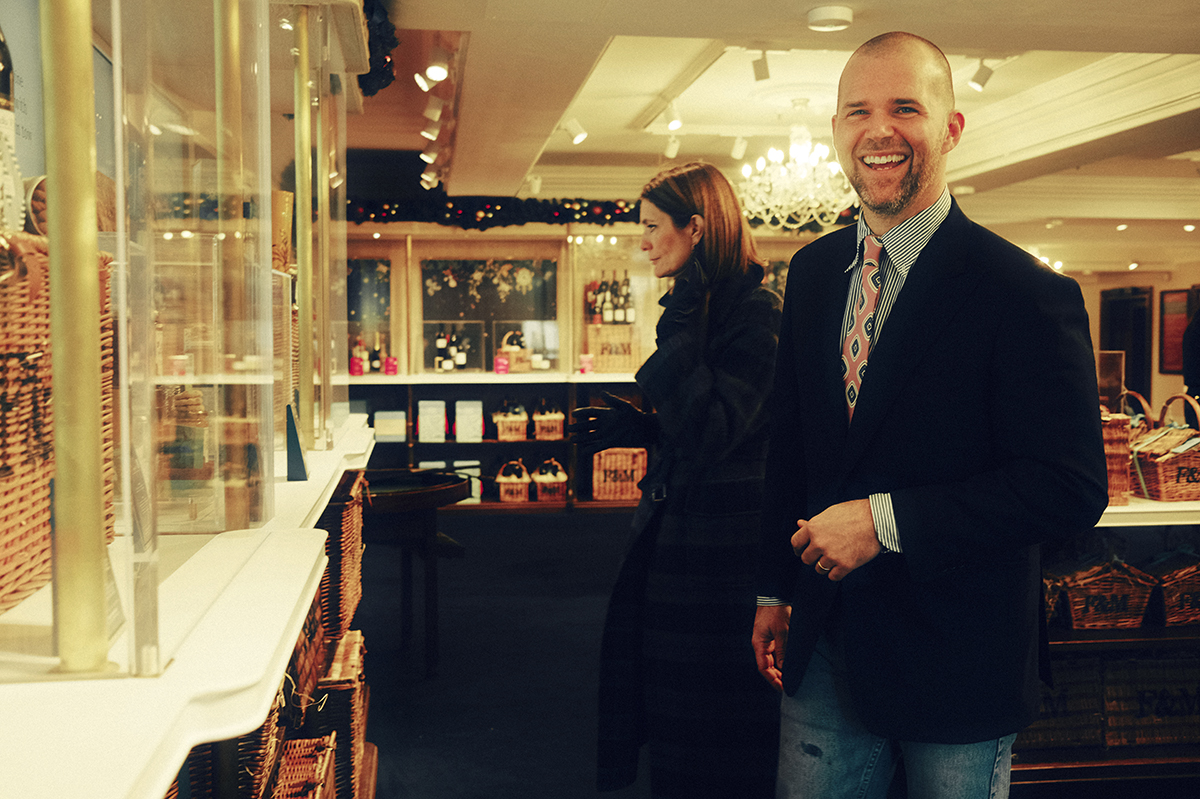When John F. Kennedy was president, McDonald’s invented the Filet-O-Fish to cater for Catholics who wouldn’t touch hamburgers on Fridays and were harming their profits. Nearly 60 years later, the flaccid fish sandwich is still on the menu, but it’s unlikely that McDonald’s or anyone else will introduce products catering specially for Catholics during the administration of America’s second Catholic president. The tumbleweed in the ruined dioceses of the rust belt is rolling across the country. Countless parishes will die of the complications of COVID-19; many will be euthanized by their own bishops, who’ve found just the excuse they needed to close them.
So it’s an odd time for Catholic intellectuals to be proposing changes to the US Constitution that they hope will be a prelude to the worldwide subjugation of secular rulers to the Catholic Church. But, as I report in the most recent episode of The Spectator’s Holy Smoke podcast, that’s what’s happening. The movement is generally known as Integralism, a label previously applied to ultra-conservative Catholic reactionaries before World War Two. Action Française, for example, was a far-right Catholic monarchist movement with firm but not exterminationist views on Jews; they had their place in an ‘Integral’ France, but it was a lowly one where they could be baited and harassed.
In contrast, the new Integralists are not anti-Semitic. In a new Catholic polity — ideally monarchist, though that’ll be a tough sell in America — there will be no such thing as a Jewish citizen. But nor will there be Methodist citizens. Or Anglo-Catholic ones, however lavishly ‘Roman’ their Episcopal Masses. As for ‘heretics’, by which I assume they mean Catholics who spread dissent, ‘the temporal power may use bloody means, even capital punishment, when acting on its own authority: within Christendom it may also do this against spiritual offenses like heresy if they gravely harm the common temporal good.’
I’m taking all this from Integralism: A Manual of Political Philosophy (2020), co-authored by the English Dominican Fr Thomas Crean and Alan Fimister, who teaches theology and Church history at St John Vianney Theological Seminary in Colorado. Woke it is not:
‘The husband has by natural right the authority to govern his wife so the family may attain its end…if her domestic duties are not thereby harmed, the wife may by her husband’s consent labour outside the home, although in a well-ordered society, this will not be necessary for the maintenance of the family.’
I asked a well-informed conservative Catholic priest what he made of this ‘manual’. He said it was ‘on the spectrum’ rather than sinister. I’d say it’s both. The book is written in hideous cod-Thomistic prose that certainly brings to mind the flapping of white coats. But that’s nothing compared to the craziness of its underlying assumption, which is that if Catholics pay enough attention to St Thomas Aquinas then we can return to a heresy-hunting Christendom headed by the Pope. Quite how Boris Johnson, Emmanuel Macron, Angela Merkel etc. can be persuaded to ‘take the bow’ in front of the Supreme Pontiff is not explained. Presumably that will be up to their successors, swept to power in the coming Integralist surge. I suppose it’s just possible that Joe Biden will do it, being ‘devoutly Catholic’ and a bit confused — but so far the evidence suggests that in that relationship it’s the Vatican doing the genuflecting.
But Crean and Fimister have far less influence than the new standard-bearer of Integralism in the United States, Adrian Vermeule, who is the Ralph S. Tyler Jr. professor of Constitutional Law, Harvard Law School. Harvard Law! And a named chair! It’s a neat title to have if you want to sit at the heart of the academy making wild assertions way outside your area of expertise. You can see Prof Vermuele doing it here, in Princeton’s annual Herbert W. Vaughan lecture on America’s Founding Principles. (That’s Herbert Vaughan the Boston real estate developer, not the long-dead English cardinal.)
And ‘assertions’ is the word: Vermeule asks us to swallow whole the proposition that both ‘liberalism’ and free-market economics are ‘pervasively sacramental’ theologies. This is an argument that, to the best of my knowledge, no scholar of religion has ever made in such bald terms. But it’s tailor-made for a conspiracy narrative that begins with the ‘Goddess of Reason’ taking the place of the Virgin Mary in a desecrated Notre-Dame during the French Revolution — which is what Christians are really up against, according to Vermeule.
Yikes. How do we get out of this burning building? Enter ‘common-good constitutionalism’, which isn’t a snappy term but is less likely to frighten the horses than Integralism — which is what it is. In an article in the Atlantic last year, Vermeule proposed sweeping away libertarian concepts of free speech. Under a common-good constitutionalist ‘regime’, the law will teach, habituate and re-form its ‘subjects’, who will thank their ‘ruler’ for helping them form ‘better habits, and beliefs that better track and promote communal well-being’. And if they don’t? The state will ‘curb the social and economic pretensions of the urban-gentry liberals who so often place their own satisfactions (financial and sexual) and the good of their class or social milieu above the common good’.
There’s no mention of Catholicism in the Atlantic article, but elsewhere the professor, who converted to the faith as recently as 2016, argues that US immigration policy should automatically give priority to confirmed Catholics, adding that we need to re-think the nation state: ‘We have come a long way, but we still have far to go — towards the eventual formation of the Empire of Our Lady of Guadalupe, and ultimately the world government required by natural law.’
Integralism is nuts, in other words. You’ve probably never met a single person who subscribes to it — unless you hang out with 24-year-old pipe-smoking fogeys whose idea of a good time is curling up with G.K. Chesterton in front of a roaring auto-da-fe. What I can’t work out is why non-integralist conservative Catholics give these ideas so much airtime. The widely respected Robert P. George, McCormick Professor of Jurisprudence at Princeton, was on Twitter this week praising Vermeule’s ‘excellent point’ that students of politics and law are ignorant of ‘what Isaiah Berlin described as “the central tradition of Western thought” about morality, politics and law’. So I pointed out that Sir Isaiah, if he were alive today, would as a Jew be ineligible for citizenship in an Integralist utopia. No answer.
As I say in the podcast, the Integralists have about as much chance of refashioning the Constitution as a Gettysburg reenactment does of altering the actual outcome of the American Civil War. What harm can there be in a few consenting adults engaging in Thomistic cosplay?
Under normal circumstances, none. But right now the Biden administration’s witchfinders are on red alert, and they’ve already taken careful note of the Integralist’s imperial fantasies. Look! There really are well-connected theocrats out there, planning to impose Catholic Sharia with the help of brainwashed Papists on the Supreme Court. That’s the message of a horrible article by Peter Hammond Schwartz in the February 3 issue of The New Republic. It’s accompanied by a mock-up of Amy Coney Barrett dressed as a bishop, sitting on a gold throne — illustrating not only the article’s anti-Catholic bigotry but also its massive ignorance, since Justice Barrett’s strict constitutionalism is despised by Integralists.
Vermeule’s insistence that liberalism is a theology with liturgy and sacraments may be hyperbolic nonsense, but there’s no mistaking the fundamentalist zeal of the progressives swept up in what Matthew Yglesias calls ‘the Great Awokening’. Do I detect a hint of admiration for them in the eyes of this tiny authoritarian Catholic sect? As in: we’ll learn from your mistakes as you go about constructing your own Year Zero. Then it’s our turn. And, in the meantime, here’s some ammunition.

























